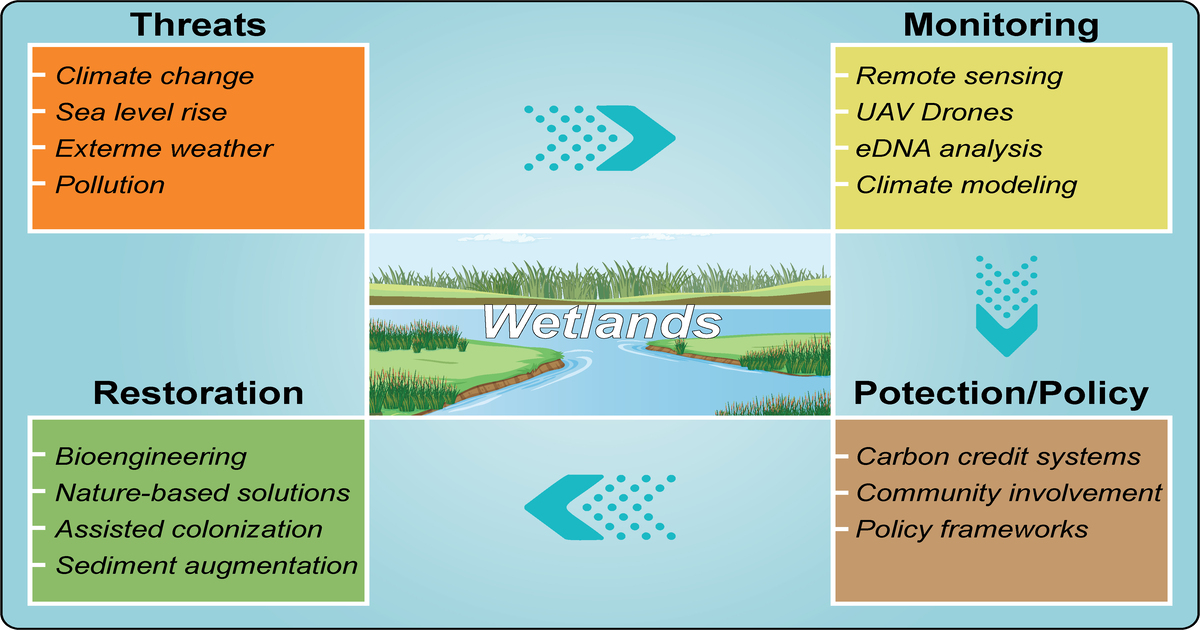- 3.0Impact Factor
- 6.0CiteScore
- 20 daysTime to First Decision
Monitoring, Restoration and Protection in Wetland Ecosystems
This special issue belongs to the section “Biodiversity and Functionality of Aquatic Ecosystems“.
Special Issue Information
Dear Colleagues,
Wetlands are among the most ecologically valuable ecosystems, supporting a rich diversity of life and providing essential services such as biodiversity conservation, flood regulation, water filtration, and carbon sequestration. Coastal wetlands, including salt marshes, mangroves, and seagrass meadows, are particularly important as blue carbon ecosystems, capturing and storing carbon at rates far exceeding those of terrestrial forests. However, these ecosystems are increasingly threatened by climate change, sea level rise, extreme weather events, pollution, and habitat degradation, all of which can significantly impact their biodiversity and functional integrity. Understanding the interplay between environmental stressors and wetland ecosystem functionality requires advanced monitoring, innovative restoration techniques, and robust protection strategies. This Special Issue invites research that enhances methods for monitoring, restoring, and safeguarding wetland biodiversity and ecosystem functioning. We welcome studies that explore, but are not limited to, the following themes:
- Wetland monitoring: use of remote sensing, UAV (drone) surveys, AI-driven monitoring, environmental DNA (eDNA), and climate resilience modeling to assess biodiversity, carbon dynamics, and ecosystem health;
- Restoration strategies: innovative approaches including bioengineering, hybrid green–gray infrastructure, sediment augmentation, assisted colonization, and nature-based solutions to support biodiversity and functional recovery;
- Protection and policy frameworks: the role of blue carbon credit systems, community-led conservation, traditional ecological knowledge, and policy innovations in sustainable wetland management.
By bringing together insights from ecologists, climate scientists, engineers, policymakers, and conservation practitioners, this Special Issue aims to bridge emerging research with real-world applications. Our goal is to provide actionable knowledge that supports the biodiversity, functionality, and resilience of blue-carbon wetlands amid climate change and increasing environmental pressures. We welcome original research articles, reviews, and short communications that advance our understanding of wetland conservation in a rapidly changing world.
Dr. Md Khurshid Alam Bhuiyan
Guest Editor
Manuscript Submission Information
Manuscripts should be submitted online at www.mdpi.com by registering and logging in to this website. Once you are registered, click here to go to the submission form. Manuscripts can be submitted until the deadline. All submissions that pass pre-check are peer-reviewed. Accepted papers will be published continuously in the journal (as soon as accepted) and will be listed together on the special issue website. Research articles, review articles as well as short communications are invited. For planned papers, a title and short abstract (about 250 words) can be sent to the Editorial Office for assessment.
Submitted manuscripts should not have been published previously, nor be under consideration for publication elsewhere (except conference proceedings papers). All manuscripts are thoroughly refereed through a single-blind peer-review process. A guide for authors and other relevant information for submission of manuscripts is available on the Instructions for Authors page. Water is an international peer-reviewed open access semimonthly journal published by MDPI.
Please visit the Instructions for Authors page before submitting a manuscript. The Article Processing Charge (APC) for publication in this open access journal is 2600 CHF (Swiss Francs). Submitted papers should be well formatted and use good English. Authors may use MDPI's English editing service prior to publication or during author revisions.
Keywords
- blue carbon ecosystems
- coastal wetlands
- wetland monitoring
- climate resilience
- extreme weather
- nature-based solutions
- carbon sequestration
- bioengineering and restoration
- community-led conservation
- carbon credit mechanisms

Benefits of Publishing in a Special Issue
- Ease of navigation: Grouping papers by topic helps scholars navigate broad scope journals more efficiently.
- Greater discoverability: Special Issues support the reach and impact of scientific research. Articles in Special Issues are more discoverable and cited more frequently.
- Expansion of research network: Special Issues facilitate connections among authors, fostering scientific collaborations.
- External promotion: Articles in Special Issues are often promoted through the journal's social media, increasing their visibility.
- e-Book format: Special Issues with more than 10 articles can be published as dedicated e-books, ensuring wide and rapid dissemination.

